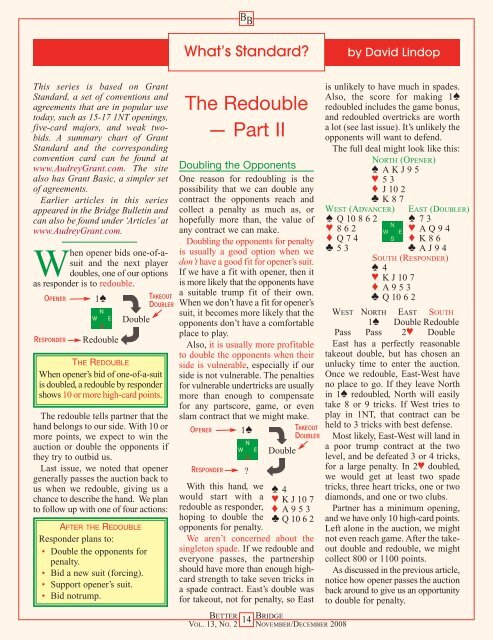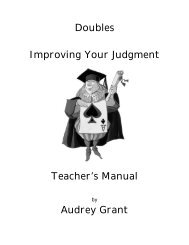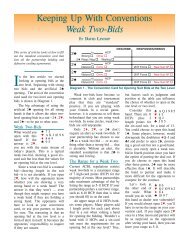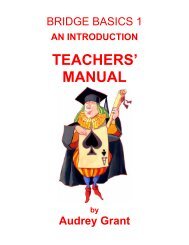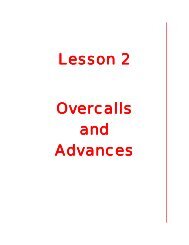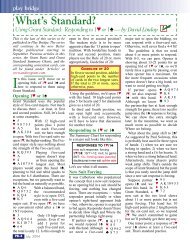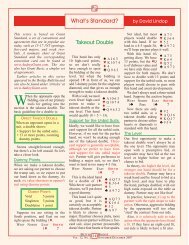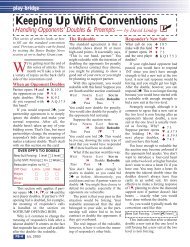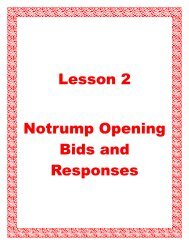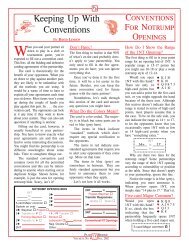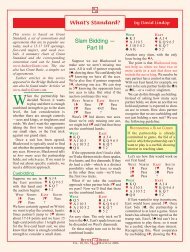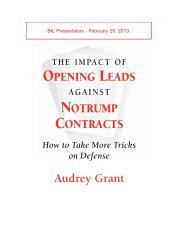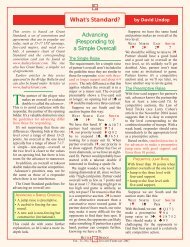The Redouble â Part II - Better Bridge
The Redouble â Part II - Better Bridge
The Redouble â Part II - Better Bridge
Create successful ePaper yourself
Turn your PDF publications into a flip-book with our unique Google optimized e-Paper software.
B B<br />
What’s Standard?<br />
by David Lindop<br />
This series is based on Grant<br />
Standard, a set of conventions and<br />
agreements that are in popular use<br />
today, such as 15-17 1NT openings,<br />
five-card majors, and weak twobids.<br />
A summary chart of Grant<br />
Standard and the corresponding<br />
convention card can be found at<br />
www.AudreyGrant.com. <strong>The</strong> site<br />
also has Grant Basic, a simpler set<br />
of agreements.<br />
Earlier articles in this series<br />
appeared in the <strong>Bridge</strong> Bulletin and<br />
can also be found under ‘Articles’at<br />
www.AudreyGrant.com.<br />
When opener bids one-of-asuit<br />
and the next player<br />
doubles, one of our options<br />
as responder is to redouble.<br />
OPENER<br />
RESPONDER<br />
1♠<br />
N<br />
W E<br />
S<br />
<strong>Redouble</strong><br />
Double<br />
TAKEOUT<br />
DOUBLER<br />
THE REDOUBLE<br />
When opener’s bid of one-of-a-suit<br />
is doubled, a redouble by responder<br />
shows 10 or more high-card points.<br />
<strong>The</strong> redouble tells partner that the<br />
hand belongs to our side. With 10 or<br />
more points, we expect to win the<br />
auction or double the opponents if<br />
they try to outbid us.<br />
Last issue, we noted that opener<br />
generally passes the auction back to<br />
us when we redouble, giving us a<br />
chance to describe the hand. We plan<br />
to follow up with one of four actions:<br />
AFTER THE REDOUBLE<br />
Responder plans to:<br />
• Double the opponents for<br />
penalty.<br />
• Bid a new suit (forcing).<br />
• Support opener’s suit.<br />
• Bid notrump.<br />
<strong>The</strong> <strong>Redouble</strong><br />
— <strong>Part</strong> <strong>II</strong><br />
Doubling the Opponents<br />
One reason for redoubling is the<br />
possibility that we can double any<br />
contract the opponents reach and<br />
collect a penalty as much as, or<br />
hopefully more than, the value of<br />
any contract we can make.<br />
Doubling the opponents for penalty<br />
is usually a good option when we<br />
don’t have a good fit for opener’s suit.<br />
If we have a fit with opener, then it<br />
is more likely that the opponents have<br />
a suitable trump fit of their own.<br />
When we don’t have a fit for opener’s<br />
suit, it becomes more likely that the<br />
opponents don’t have a comfortable<br />
place to play.<br />
Also, it is usually more profitable<br />
to double the opponents when their<br />
side is vulnerable, especially if our<br />
side is not vulnerable. <strong>The</strong> penalties<br />
for vulnerable undertricks are usually<br />
more than enough to compensate<br />
for any partscore, game, or even<br />
slam contract that we might make.<br />
OPENER 1♠<br />
RESPONDER<br />
With this hand, we<br />
would start with a<br />
redouble as responder,<br />
hoping to double the<br />
opponents for penalty.<br />
We aren’t concerned about the<br />
singleton spade. If we redouble and<br />
everyone passes, the partnership<br />
should have more than enough highcard<br />
strength to take seven tricks in<br />
a spade contract. East’s double was<br />
for takeout, not for penalty, so East<br />
BETTER<br />
VOL. 13, NO. 2<br />
N<br />
W E<br />
S<br />
?<br />
14<br />
Double<br />
TAKEOUT<br />
DOUBLER<br />
♠ 4<br />
♥ K J 10 7<br />
♦ A 9 5 3<br />
♣ Q 10 6 2<br />
BRIDGE<br />
NOVEMBER/DECEMBER 2008<br />
is unlikely to have much in spades.<br />
Also, the score for making 1♠<br />
redoubled includes the game bonus,<br />
and redoubled overtricks are worth<br />
a lot (see last issue). It’s unlikely the<br />
opponents will want to defend.<br />
<strong>The</strong> full deal might look like this:<br />
NORTH (OPENER)<br />
♠ A K J 9 5<br />
♥ 5 3<br />
♦ J 10 2<br />
♣ K 8 7<br />
WEST (ADVANCER)<br />
EAST (DOUBLER)<br />
♠ Q 10 8 6 2 ♠ 7 3<br />
N<br />
♥ 8 6 2<br />
W E<br />
♥ A Q 9 4<br />
♦ Q 7 4 S ♦ K 8 6<br />
♣ 5 3 ♣ A J 9 4<br />
SOUTH (RESPONDER)<br />
♠ 4<br />
♥ K J 10 7<br />
♦ A 9 5 3<br />
♣ Q 10 6 2<br />
WEST NORTH EAST SOUTH<br />
1♠ Double <strong>Redouble</strong><br />
Pass Pass 2♥ Double<br />
East has a perfectly reasonable<br />
takeout double, but has chosen an<br />
unlucky time to enter the auction.<br />
Once we redouble, East-West have<br />
no place to go. If they leave North<br />
in 1♠ redoubled, North will easily<br />
take 8 or 9 tricks. If West tries to<br />
play in 1NT, that contract can be<br />
held to 3 tricks with best defense.<br />
Most likely, East-West will land in<br />
a poor trump contract at the two<br />
level, and be defeated 3 or 4 tricks,<br />
for a large penalty. In 2♥ doubled,<br />
we would get at least two spade<br />
tricks, three heart tricks, one or two<br />
diamonds, and one or two clubs.<br />
<strong>Part</strong>ner has a minimum opening,<br />
and we have only 10 high-card points.<br />
Left alone in the auction, we might<br />
not even reach game. After the takeout<br />
double and redouble, we might<br />
collect 800 or 1100 points.<br />
As discussed in the previous article,<br />
notice how opener passes the auction<br />
back around to give us an opportunity<br />
to double for penalty.
Bidding a New Suit<br />
With a good five-card or longer suit<br />
and 10 or more high-card points,<br />
responder typically starts with a<br />
redouble. <strong>The</strong>re’s the possibility that<br />
the opponents might choose to play<br />
in that suit, in which case responder<br />
can double for penalty. Otherwise,<br />
responder can simply bid the suit at<br />
the next opportunity.<br />
OPENER<br />
RESPONDER<br />
1♥<br />
N<br />
W E<br />
S<br />
?<br />
If East had passed,<br />
we’d have responded<br />
2♦ with this hand.<br />
Once East doubles,<br />
we start with a<br />
Double<br />
TAKEOUT<br />
DOUBLER<br />
♠ 10 4<br />
♥ 8 3<br />
♦ A K J 9 6 5<br />
♣ K 7 4<br />
redouble to show 10 or more highcard<br />
points. If the opponents bid<br />
diamonds, we’ll be happy to double.<br />
If, as is more likely, they bid some<br />
other suit, we can then show our<br />
diamond suit. For example:<br />
WEST NORTH EAST SOUTH<br />
1♥ Double <strong>Redouble</strong><br />
1♠ Pass Pass 2♦<br />
Our 2♦ bid is forcing. It’s just as<br />
though there were no interference<br />
and we responded in a new suit at<br />
the two level. So why redouble?<br />
<strong>The</strong> key point is that if we didn’t<br />
redouble first, a response of 2♦<br />
would show fewer than 10 high-card<br />
points and would not be forcing.<br />
This is an important corollary to the<br />
use of the redouble:<br />
RESPONDER’S FAILURE<br />
TO REDOUBLE<br />
When responder doesn’t redouble,<br />
responder typically shows fewer<br />
than 10 high-card points.<br />
We’ll look at some exceptions in<br />
the next issue, but it’s this concept that<br />
impacts the meaning of responder’s<br />
bids following a takeout double. So,<br />
an immediate bid of a new suit at<br />
the two level is no longer forcing<br />
since responder failed to start with a<br />
redouble. Opener ‘knows’ responder<br />
has fewer than 10 high-card points.<br />
B B<br />
Supporting Opener’s Suit<br />
With 10 or more high-card points and<br />
support for opener’s suit, responder<br />
typically starts with a redouble. <strong>The</strong><br />
‘typically’ is there because responder<br />
does have other options, which we’ll<br />
address in the next issue.<br />
OPENER 1♠<br />
RESPONDER<br />
This hand has 10 ♠ Q 9 3<br />
high-card points, so ♥ 9 2<br />
we would again start ♦ A 10 7 5<br />
with a redouble. ♣ K J 8 3<br />
Suppose the auction continues:<br />
WEST NORTH EAST SOUTH<br />
1♠ Double <strong>Redouble</strong><br />
2♥ Pass Pass ?<br />
With only a doubleton heart, we<br />
don’t want to double the opponent’s<br />
2♥ contract for penalty. Even if our<br />
partnership has the majority of the<br />
high-card strength, it’s usually not a<br />
good idea to make a penalty double<br />
at a low level when our side has an<br />
eight-card or longer trump fit.<br />
So we should bid 2♠. Notice that<br />
there’s no need to jump to 3♠. We<br />
have already promised at least 10<br />
high-card points with the redouble.<br />
With support for spades and fewer<br />
than 10 points, we would have<br />
raised right away. With about 10-12<br />
points, we redouble and then show<br />
the support at the cheapest available<br />
level. In this auction, our 2♠ bid is<br />
not forcing; it’s only invitational.<br />
Opener can pass with a minimum,<br />
and we can stop in partscore at the<br />
two level.<br />
Suppose we held a<br />
stronger hand, like<br />
this. Now the auction<br />
would begin:<br />
WEST NORTH EAST SOUTH<br />
1♠ Double <strong>Redouble</strong><br />
2♥ Pass Pass 3♠<br />
Our jump to 3♠ would be forcing,<br />
showing more than a minimum for<br />
the redouble, about 13 or more<br />
points. <strong>Part</strong>ner must bid again.<br />
BETTER<br />
VOL. 13, NO. 2<br />
N<br />
W E<br />
S<br />
?<br />
15<br />
Double<br />
TAKEOUT<br />
DOUBLER<br />
♠ A 9 3<br />
♥ 9 2<br />
♦ A 10 7 5<br />
♣ K Q 8 3<br />
BRIDGE<br />
NOVEMBER/DECEMBER 2008<br />
Bidding Notrump<br />
With a balanced hand of 10 or more<br />
high-card points, responder can<br />
start with a redouble and then bid<br />
notrump if the hand isn’t suitable<br />
for making a penalty double.<br />
OPENER 1♦<br />
RESPONDER<br />
N<br />
W E<br />
S<br />
With 11 high-card<br />
points, we start with<br />
a redouble. If the<br />
opponents bid hearts<br />
or clubs, we might<br />
choose to make a penalty double,<br />
especially if they are vulnerable.<br />
But suppose the auction continues:<br />
WEST NORTH EAST SOUTH<br />
1♦ Double <strong>Redouble</strong><br />
1♠ Pass Pass ?<br />
A penalty double of 1♠ is unlikely<br />
to show a large profit, and it might<br />
even make if the opponents have<br />
found an eight-card fit. Instead, we<br />
can bid 1NT, showing about 10-12<br />
points. This is not forcing. With a<br />
stronger hand, we would jump in<br />
notrump.<br />
OPENER 1♠<br />
RESPONDER<br />
With 14 high-card<br />
points, we would start<br />
with a redouble after<br />
East doubles. Suppose<br />
the auction continues:<br />
?<br />
N<br />
W E<br />
S<br />
?<br />
Double<br />
TAKEOUT<br />
DOUBLER<br />
♠ Q J 9<br />
♥ Q J 7 3<br />
♦ Q 4<br />
♣ K 10 8 2<br />
Double<br />
TAKEOUT<br />
DOUBLER<br />
♠ 6 4<br />
♥ K Q 10<br />
♦ A J 9 5<br />
♣ K J 8 2<br />
WEST NORTH EAST SOUTH<br />
1♠ Double <strong>Redouble</strong><br />
2♥ Pass Pass ?<br />
If the opponents had bid clubs or<br />
diamonds, we’d probably double for<br />
penalty. In hearts, there’s too much<br />
danger that they’ve found an eightcard<br />
fit. <strong>The</strong> safe option is probably<br />
to jump to 3NT. We should have<br />
enough strength to take nine tricks.<br />
If East-West were vulnerable and<br />
our side were not, double would be<br />
more appealing. Even a penalty of<br />
500 points for down two would be<br />
more than the value of our game.


